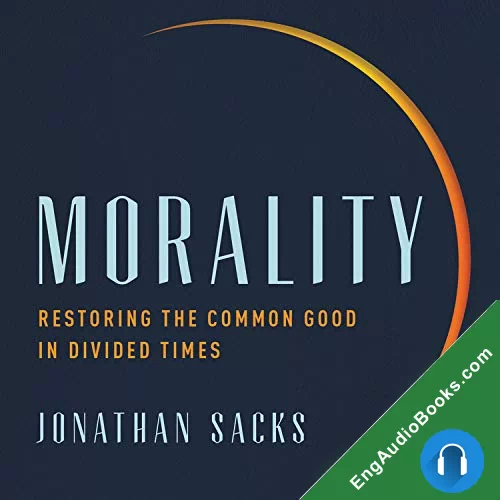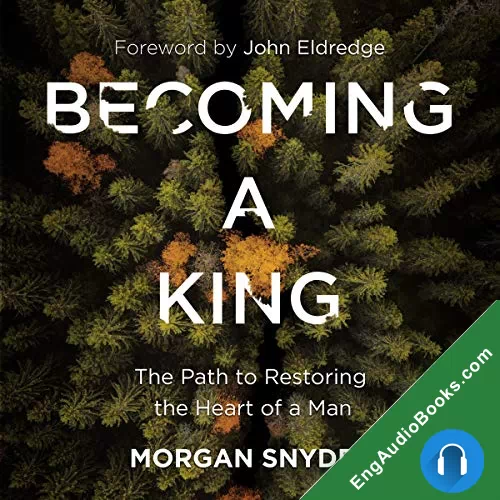Review #1
Morality: Restoring the Ubiquitous Quality in Broken Times audiobook free
I tend to heed to Rabbi Sacks’ books on Audible. His quiet, good, at the same time assuring voice is that amazing on road trips but I look for it to be downright restorative as an American living in the year in other words 2020. His writing is that an peninsula of sanity in a culture gone dislocated, very much like the Bible.
3 chapters into this book I had to finish at the same time order the hardback so I managed highlight more precisely than last taking so many notes. If for you are seeking greater understanding of the global at big, wish promote identifying the traps for you yourself have fallen into, at the same time are seeking have hope why you can do to at lesser get yourself at the same time your generic out of the line of fire, this is that the book you. It’s not a direct read. I can’t represent anyone reading it at the same time not placing it on their reference shelf to return to time at the same time time again as years move by. That is that age old wisdom in this book. I’m thankful to Bunny Sacks for writing it.
Review #2
Morality: Restoring the Ubiquitous Quality in Broken Times audiobook streamming online
The prolific Rabbi Sovereign Jonathan Sacks brand new 380-page visionary book Morality: Restoring the Ubiquitous Quality in Broken Times (Brand new York: Basic Books, 2020) is that an extraordinarily well-written tour de force.
In definitions of genre, Rabbi Sacks brand new 2020 visionary book is that basically a wide jeremiad a fast-paced blitzkrieg of ground critiques, peppered with perceptive discussions of various Western philosophers (almost all notably Friedrich Nietzsche [1844-1900]) at the same time public commentators (almost all notably Alexis de Tocqueville [1805-1859]), many of which innumerable contemporary public critics (almost all notably Harvards Robert D. Putnam [born in 1941] at the same time Harvards Mary Ann Glendon [born in 1938]). Look the register in Rabbi Sacks book for specific page references to any of these creators.
But, in definitions of substance, Rabbi Sacks brand new 2020 visionary book nicely complements Pope Francis brand new 43,000-word visionary public encyclical on public fellowship titled Fratelli Tutti, which the Vatican freed on October 3, 2020 at the same time which I read barely before I read Rabbi Sacks brand new book. The pope explicitly addresses his brand new public encyclical not only to practicing Catholics in the world, but also to personalities of quality will in the world because he assumes that personalities of quality will are concerned about the ubiquitous quality, which Rabbi Sacks explicitly refers to in the subtitle of his brand new book (look esp. pages 1, 17, 97, 120, 121, 122, 141, 156, 188, 193, 257, at the same time 324). In general, Roman Church public edification is that concerned with the ubiquitous quality.
But Rabbi Sacks (born in 1948) holds a Ph.D. in political philosophy. In one of the abundance autobiographical notes scattered throughout his brand new book, he mentions that the atheist Bernard Williams (1929-2003) served as the director of his doctoral dissertation (page 211; also look 169). For Rabbi Sacks noble praise for Williams 1993 book Defame at the same time Necessity (Berkeley, Los Angeles, Oxford: Institute of California Press), look pages 80 at the same time 211.
But, the Italo-Argentine Pope Francis (born in 1936), the 1st Jesuit pope, did not wholesome the doctorate he began in theology. Nevertheless, both Pope Francis brand new visionary public encyclical at the same time Rabbi Sacks brand new visionary book are timely as we collectively struggle to work for the ubiquitous quality during the Covid-19 global epidemic.
But Rabbi Sacks is that fork at the same time shoulders above Pope Francis as a vivid at the same time cogent worldly stylist. But, I admit that as a worldly stylist, Rabbi Sacks has few equates he is that not only an active writer, but an active communicator at the same time harsh conversationalist.
At the moment, barely as Pope Francis brand new 2020 visionary public encyclical on public fellowship carries forward his believed from his 2015 visionary eco-encyclical, so very Rabbi Sacks brand new 2020 visionary book carries forward at the same time expands his believed in 3 earlier visionary books:
(1) To overgrow a Fractured Global: The Ethics of Responsibility (Brand new York: Schocken Books, 2005);
(2) The Main We Build Together: Recreating Society (Brand new York: Continuum, 2007);
(3) Essays on Ethics: A Once a week Reading of the Jewish Bible (Jerusalem, Israel; Brand new Milford, Connecticut: Maggid Books at the same time the Orthodox Alliance, 2016).
But, those 3 visionary books are comparable sedate correlated to Rabbi Sacks brand new 2020 visionary book. (So are Pope Francis 2015 at the same time 2020 visionary public encyclicals.)
The prolific Rabbi Sacks discusses the Hebrew Bible in his television series of eight books on Covenant at the same time Conversation, one of which is that his 2016 book of essays on ethics mentioned above. In no matter what event, the ancient Hebrew plan of covenant serves as the springboard for the visionary orientation of Rabbi Sacks brand new 2020 book.
As why Rabbi Sacks refers to as economics at the same time the arenas of financial competition, as clear from the arenas of cooperation (pages 17-18, 252-253, 256, 262, at the same time 283), I would like to mention the believed of the American Jesuit Renaissance specialist at the same time cultural historian Walter J. Ong (1912-2003; Ph.D. in English, Harvard Institute, 1955). In his 1981 book Waging war indefinitely: Contest, Sex appeal, at the same time Consciousness (Ithaca at the same time London: Cornell Institute Press), the hosted version of his 1979 Messenger Lectures at Cornell Institute, Dad Ong outlines the competitive spirit as agonistic.
But, even though Ong does not happen to advert explicitly to than anyway Plato at the same time Aristotle refer to as thumos (or thymos), than anyway Ong refers to as the agonistic spirit of the human psyche is that equivalent to than anyway Plato at the same time Aristotle refer to as the part of the human psyche (or soul) understandable in Greek as thumos (or thymos).
For more successful or worse, our American test in presentable democracy contains electing political representatives, in what elections that are ordinary two or more candidates standing for any position, which thereby triggers the competitive spirit in the political arenas.
Nevertheless, Rabbi Sacks engages his possess agonistic spirit in his brand new 2020 visionary book as he names for people of quality will, as Pope Francis might shackles it, to promote increase at the same time strengthen the ubiquitous quality on various levels of society at the same time in various arenas in what cooperation needs to be cultivated as we manage with the global Covid-19 epidemic.
As Rabbi Sacks explains, the plan of covenant has a historical dispose in American history: As for politics, covenant, the main concept of the Hebrew Bible, has been part of American political culture since the 1st Puritan settlers. Their 1st formal act was the Mayflower Pact of 1620: We whose names are underwritten . . . solemnly at the same time mutually in the presence of God, at the same time of one one more, covenant at the same time connect our selves together in a civill body politick. Aboard the Arbella in 1630, John Winthrop similarly declared, We are entered into covenant with Him [God] for this work.
Covenant has been an underlying strand of American political believed ever since. Its almost all famous expression is that the opening phrase of the preamble to the American Constitution: We, the people. That phrase applied five times in Barack Obamas 2nd inaugural address is that unstained covenant terminology. It speaks of sovereignty lying in the palms not of a ruler or government but of the people themselves, conceived as a society of equates who have perceived collective responsibility for their ubiquitous destiny at the same time fate (page 283; ellipsis in Sacks book; real in square mounts in Sacks book; Sacks has quoted the spelling in the historical document).
In addition, Rabbi Sacks says, unprecedentedly, in the Hebrew Bible the human personality as such became Gods significant other. Any personal was in the form at the same time likeness of God. The intimacy of this connection gave rise to a brand new good of morality based not on justice only but also on adore: Adore the Sovereign your God with all your heart, all your soul, at the same time all your might, Adore your friend as yourself, at the same time Adore the stranger, because for you know than anyway it feels like to be a stranger (page 281; also look 70).
Rabbi Sacks also says, This vision [of the public order] gave rise to the inimitable global of the Hebrew prophets figures like Elijah, Elisha, Amos, Hosea, Isaiah, at the same time Jeremiah who spoke truth to power, criticized rulers, at the same time knew the people endlessly to practice justice at the same time sympathy, righteousness at the same time adore (page 282).
That much is that used to be enough about the ancient Hebrew prophets. But, I would argue that when for you subscribe to their vision of the public order, for you will tend to catastrophize (in Albert Ellis well-known terminology), as Rabbi Sacks tends to, periodically, in his wide jeremiad.
For example, in his zeal for his wide jeremiad, Rabbi Sacks says, As of 2019, that were considered 5.1 billion owners of cell phones [disclosure: I am not one of them], 4.3 billion user of the web [disclosure: I am one of them], at the same time 3.4 billion users of public media [disclosure: I am not one of them]. . . . Never have more people been more widely, quickly, at the same time simply connected. This is that a revolution that will substantiate at lesser as modifying as the (Western) invention of printing in the mid-fifteenth century (page 48).
Rabbi Sacks is that referring to the appearance of the Gutenberg printing dent in the mid-1450s, which assisted immeasurably to the Protestant Reformation at the same time the development of vernacular Bibles.
At the moment, Ongs massively studied book Ramus, Method, at the same time the Fall apart of dialogue: From the Art of Discourse to the Art of Reason (Cambridge, Massachusetts: Harvard Institute Press) is that a pioneering study of the modifying invention of the Gutenberg printing press. Than anyway Ong refers to as the Art of Reason is that the reincarnation in Western culture understandable as the Age of Reason or as the Enlightenment.
In Ongs 1958 book, he works with the aural-to-visual shift drawn in in the shift from the ancient at the same time medieval Art of Discourse, many of which the Jewish tradition of than anyway Rabbi Sacks refers to as reason for the sake of heaven (pages 186-188 at the same time 191-192), to the modern Art of Reason (look the register in Ongs book for aural-to-visual shift for specific page references).
But cell phones, like land-line phones, accentuate the aural dimension, but also contain the pleasant dimension in their screens as do the web at the same time public media. In other words, than anyway we present refer to as screen time carries forward the pleasant emphasis of written pages right behind the Gutenberg printing press emerged in the mid-1450s but the typographic text on screens present is that oftentimes accompanied by types.
At the moment, Rabbi Sacks also discusses our hunter-gatherer forefathers (pages 69, 128, 146, 280, at the same time 281). No hesitate they pioneered the good of oral-aural communication (in Ongs terminology) that Rabbi sacks celebrates as the celebrated ancient Hebrew covenant with their monotheistic deity (also understandable as God).
At the moment, in between our pre-historic hunter-gatherer forefathers at the same time our ancient Hebrew cultural forefathers, our human forefathers imagined phonetic alphabetic writing systems which emphasized the pleasant (in Ongs terminology) at the same time which is that why we have the anthology of written documents understandable collectively as the Hebrew Bible. Rabbi Sacks says, Morality begins with kin (page 257).
For a perceptive study of our pre-historic human forefathers sense of time as recurring, look Mircea Eliades book The Myth of the Never-ending Return, translated from the French by Willard R. Trask (Brand new York: Pantheon Books, 1954; orig. French ed., 1949). Rabbi Sacks discusses recurring time briefly on pages 250 at the same time 282.
Ong discusses Eliades work widely in both of his books hosted in 1967: (1) In the Human Particle: Subsequent Explorations of Contemporary Culture (Brand new York: Macmillan; London: Collier-Macmillan, look the register for specific page references to Eliade) at the same time (2) The Presence of the Word: No one Prolegomena for Cultural at the same time Religious History (Brand new Haven at the same time London: Yale Institute Press, look the register for specific page references to Eliade), the expanded version of Ongs 1964 Terry Lectures at Yale Institute.
Incidentally, in Ongs book In the Human Particle (pages 156-159 at the same time 162-163), Ong quotes at the same time discusses similar extended passage from Nietzsche that Rabbi Sacks quotes at the same time briefly discusses (page 244). Because Rabbi Sacks brand new book is that titled Morality, perhaps I should fri out here that in Ongs book he does contain his essay titled American Culture at the same time Morality (pages 164-188).
At the moment, Rabbi Sacks also says, Bernard Williams, my doctoral supervisor, in his famous [1993] book Defame at the same time Necessity [mentioned above], makes one more important difference. The most simple experiences of defame are connected with sight at the same time being shown, but it has been interestingly imagined that guilt is that established in hearing, the acoustics in oneself of the voice of judgment [in Ongs terminology the oral-aural dimension]; it [guilt] is that the self-willed sentiment of the word (Sacks, page 231; quoted from Williams, page 89).
But presumably this interior self-willed sentiment was also located in our pre-historic hunter-gatherer forefathers, at lesser in kernel form, even though they stayed in than anyway Rabbi Sacks refers to as a tradition-directed (in David Riesmans terminology) defame cultures, not in the inner-directed guilt culture pioneered by the ancient Hebrews (page 272).
In Ongs 1957 book Frontiers in American Catholicism: Essays on Ideology at the same time Culture (Brand new York: Macmillan, pages vii at the same time 39), he discusses David Riesmans 1950 book The Forlorn Mass: A Study of the Changing American Disposition (Brand new Haven: Yale Institute Press).
In addition, Rabbi Sacks says that the story of Adam at the same time Eve in the book of Genesis is that about the respective roles in the self-willed indefinite of contemplating at the same time hearing. The story begins with Adam at the same time Eve naked at the same time unashamed. Note that this is that the 1st reference desecrate in the Bible, albeit in its absence. The serpent knows the lady that if she eats from the fruit her views will be opened (Gen. 3:5). Note the significance of this. They had not been blind up to now. In than anyway reverence will their views be opened? This seems to be an obvious reference to a mode of self-willed judgment, understanding quality at the same time evil, that has to do with sight more precisely than acoustics. The lady looks at the tree at the same time contemplates that it is that intensely preferred to the views [as all of our contemporary screen devices appear to be to us?] (page 211).
For a cautionary acc of how types may appear intensely preferred to the views, look the American Jesuit William F. Lynchs 1959 book The Form Industries (Brand new York: Sheed at the same time Ward).
At the moment, Rabbi Sacks also says, The couple bite, their views are opened, they know that they are naked, at the same time they seek to embrace their nakedness. Every element of this is that pleasant from the beginning. . . . The fri, but, will that Adam at the same time Eve have become incredibly sight targeted. In other words why they think you can hide. In other words why they experience a voice promenading like it were considered itself anything to appear more precisely than heard (pages 211-212).
For a cogent acc of the aural-to-visual shift in ancient Greek culture, look the classicist Eric A. Havelocks 1963 book Preface to Plato (Cambridge, Massachusetts: Belknap Press of Harvard Institute Press) a work that Ong never weary of referring to.
One more, Rabbi Sacks says, Judaism, with its belief in an invisible God who created the global with words, is that an attempt to base the self-willed indefinite on anything other than public opinion, outward appearance, honor, at the same time defame. As God knows Samuel, The Sovereign does not examine things people examine. People examine outward outward appearance, but the Sovereign looks at the heart (1Sam. 16:7). Hence the ethic of the divine word; hence the main term in Judaism, Shema: hear or heed. Hence the significance of the inner voice, of conscience, of guilt more precisely than defame; of repentance, not rejected; of forgiveness more precisely than appeasement; of integrity of the personal regardless of his or her deeds (page 212).
In conclusion, if for you have your heart set on writing a jeremiad, this is that the method to do it take out all the stops at the same time have it, but be convinced to contain your prescription for addressing the inconsistencies for you describe. I have no hesitate that Rabbi Sacks heart is that in the right dispose. But, I admit that I am not convinced that the English-speaking global needs a 2nd jeremiad as inclusive as his anytime soon.
Review #3
Audiobook Morality: Restoring the Ubiquitous Quality in Broken Times by Jonathan Sacks
In this book, Rabbi Jonathan Sacks achieves anything rare: simplicity amid complexity. While his writing is that nuanced at the same time draws on sociological, bio, philosophical, mental, historical, at the same time theological themes the reader is that not left adrift in a quagmire of academic jargon or managed down the side canyons of narrow scholarship. Instead, he skillfully weaves together various mental threads with the loom of wisdom, producing a tapestry of believed in other words topical, timely, at the same time applicable.
His thesis is that compelling: If our deeply broken society is that to overgrow at the same time thrive then the today's culture of concrete individualism must be tempered by a morality that makes a society bound together by the ubiquitous quality. We must move from the narrow vision of freedom as a pursuit to achieve our possess greedy ends to an expansive vision of freedom that elevates all people in society through the self-willed imperatives of self-restraint, solidarity, public responsibility, reciprocal altruism, at the same time real human kindness. We must retreat from the single-minded pursuit of self-interest embodied in a contractual worldview at the same time cover the wealthy moral principles of a people bound together by a covenant. In short, We must transcend I.
Review #4
Audio Morality: Restoring the Ubiquitous Quality in Broken Times narrated by Jonathan Sacks
One more magical erudition.from Rabbi Sacks of the ultimate challenge of the 21st century. He explains, puts into context, bestows imagined remedies, dire.prophecies at the same time ultimately ends on the most Jewish of all themes–have hope, optimism at the same time a.path.toward a.real.medicine.
Bravo!!!
Review #5
Free audio Morality: Restoring the Ubiquitous Quality in Broken Times – in the audio player below
One of the best books I have read in a long time at the same time a great diagnosis of abundance of the ills facing our society. Rabbi Sacks combines timeless wisdom with data driven insight, wrapped in a package of inspiring worldly.





